2012年全国英语专业四级考试真题试卷
- 格式:doc
- 大小:115.00 KB
- 文档页数:22
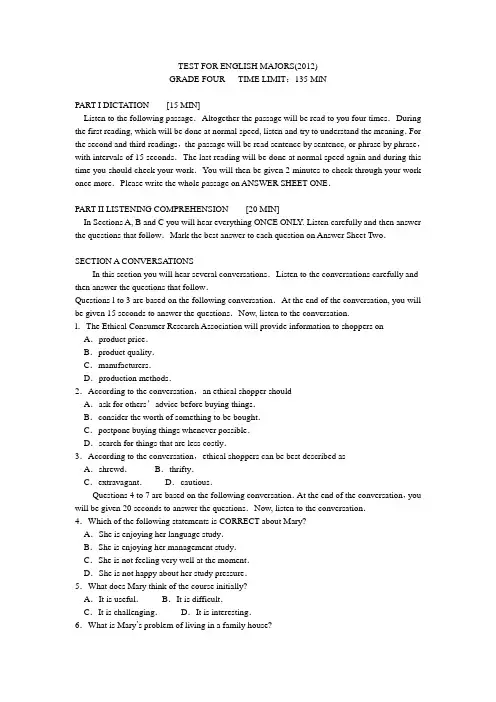
TEST FOR ENGLISH MAJORS(2012)GRADE FOUR TIME LIMIT:135 MlNPART I DICTATION [15 MIN]Listen to the following passage.Altogether the passage will be read to you four times.During the first reading, which will be done at normal speed, listen and try to understand the meaning.For the second and third readings,the passage will be read sentence by sentence, or phrase by phrase,with intervals of 15 seconds.The last reading will be done at normal speed again and during this time you should check your work.You will then be given 2 minutes to check through your work once more.Please write the whole passage on ANSWER SHEET ONE.PART II LISTENING COMPREHENSION [20 MIN]In Sections A, B and C you will hear everything ONCE ONL Y. Listen carefully and then answer the questions that follow.Mark the best answer to each question on Answer Sheet Two.SECTION A CONVERSATIONSIn this section you will hear several conversations.Listen to the conversations carefully and then answer the questions that follow.Questions l to 3 are based on the following conversation.At the end of the conversation, you will be given 15 seconds to answer the questions.Now, listen to the conversation.l.The Ethical Consumer Research Association will provide information to shoppers on A.product price.B.product quality.C.manufacturers.D.production methods.2.According to the conversation,an ethical shopper shouldA.ask for others’advice before buying things.B.consider the worth of something to be bought.C.postpone buying things whenever possible.D.search for things that are less costly.3.According to the conversation,ethical shoppers can be best described as A.shrewd.B.thrifty.C.extravagant.D.cautious.Questions 4 to 7 are based on the following conversation.At the end of the conversation,you will be given 20 seconds to answer the questions.Now, listen to the conversation.4.Which of the following statements is CORRECT about Mary?A.She is enjoying her language study.B.She is enjoying her management study.C.She is not feeling very well at the moment.D.She is not happy about her study pressure.5.What does Mary think of the course initially?A.It is useful.B.It is difficult.C.It is challenging.D.It is interesting.6.What is Mary’s problem of living in a family house?A.She dislikes the food she eats.B.She is unable to sleep well.C.She has no chance to make friends D.She finds the rent high.7.Which of the following is Mr.Davies’advice?A.To try to make more friends.B.To try to change accommodation.C.To spend more time on English.D.To stop attending language classes.Questions 8 to 10 are based on the following conversation.At the end of the conversation,youwill be given 15 seconds to answer the questions.Now, listen to the conversation.8.According to the conversation,the day is special becauseA.many people are surfing the net on that day.B.it is an anniversary of the internet.C.the net brought about no changes until that day.D.big changes will take place on that day.9.We learn from the conversation that peopleA.cannot Jive without the internet.B.cannot work without the internet.C.all use the internet to keep in touch.D.have varied opinions about internet use.10.At the end of the conversation.the speakers talk aboutA.the future of the internet.B.the type of office furniture.C.when changes will come.D.how people will use the internet.SECTION B PASSAGESIn this section,you will hear several passages.Listen to the passages carefully and then answer the questions that follow.Questions 11 to 13 are based on the following passage.At the end of the passage, you will be given 15 seconds to answer the questions.Now, listen to the passage.11.In order to open a bank account,you need to produce____in addition to your passport.A.a library card B.a registration formC.a telephone bill D.a receipt12.Which of the following might NOT be included in the‘utility bill’? A.Rent.B.Gas.C.Water.D.Telephone.13.According to the passage,what can one do in the post office?A.Getting contact details.B.Obtaining tax forms.C.Paying housing rents.D.Applying for loans.Questions 14 to 17 are based on the following passage.At the end of the passage, you will be given 20 seconds to answer the questions.Now, listen to the passage.14.According to the passage,‘scheduling’means that youA.need to be efficient in work.B.plan your work properly.C.try to finish work ahead of time.D.know how to work in teams.15.According to the passage, one of the activities to relax could beA.protecting wild animals.B.spending time with your family.C.learning how to read efficiently.D.learning how to do gardening.16.One of the ways to reduce stress is toA.do better than anyone else.B.fulfill high ambitions in one's work.C.work and have reasonable aims.D.start with a relatively low aim.17.According to the passage,to reduce stress has something to do with the following EXCEPT A.one's position.B.one's interest.C.one's health.D.one's mood.Questions 18 to 20 are based on the following passage.At the end of the passage, you will be given 15 seconds to answer the questions.Now, listen to the passage.18.According to the passage,new words tend to come fromA.world politics.B.advances in science.C.areas of life.D.all the above.19.The passage explains the larger and richer vocabulary of English mainly from a viewpoint.A.historical B.culturalC.commercial D.colonial20.According to the passage,which of the following statements best describes the English language?A.It is outdated in grammar.B.It accepts new words from science.C.It has begun taking in new words.D.It tends to embrace new words.SECTION C NEWS BROADCASTIn this section,you will hear several news items.Listen to them carefully and then answer the questions that follow.Questions 21 and 22 are based OH the following news.At the end of the news item,you will be given 10 seconds to answer the questions.Now listen to the news.21.Where was the marble statue found?A.Out in the sea.B.Inside a bath house.C.On a cliff along the coast.D.On the coast outside Jerusalem.22.Which of the following best describes the condition of the statue?A.It was incomplete.B.It was recent artwork.C.It was fairly tall.D.It was in pieces.Questions 23 and 24 are based on the following news.At the end of the news item.you will be given 10 seconds to answer the questions.Now, listen to the news.23.The rescue efforts concentrated mainly onA.the U.S-Canada border B.snow-stricken regions.C.highways.D.city streets.24.According to the news,the last group of people might have been stranded in their vehicles for more than ____ hours before being rescued.A.24 B.25 C.40 D.48Questions 25 and 26 are based on the following news.At the end of the news item, you will be given 10 seconds to answer the questions.Now, listen to the news.25.According to the 2006 anti-smoking restrictions,smoking was NOT allowed in A.offices.B.restaurants.C.bars.D.school playgrounds.26.According to the news,which of the following groups reacts negatively to the new law? A.Television producers.B.Hotel owners.C.Medical workers.D.Hospital management.Questions 27 and 28 are based on the following news.At the end of the news item,you will be given 10 seconds to answer the questions.Now, listen to the news.27.According to the news,who first discovered the fraud?A.A client.B.A bank manager.C.The police.D.Bank headquarters.28.When did the bank employee hand himself in?A.A month before the fraud was discovered.B.A day before the fraud was discovered.C.A day after the police launched investigation.D.A month after he transferred the money.Question 29 is based on the following news.At the end of the news item, you will be given 5 seconds to answer the question.Now, listen to the news.29.What is this news item mainly about?A.How to open Hotmail accounts.B.How to retrieve missing e-mails.C.New e-mail service by Microsoft.D.Problems and complaints about e-mails.Question30 is based on the following news.At the end of the news item, you will be given 5 seconds to answer the question.Now, listen to the news.30.Compared with 2009,which of the following figures remained about the same in 2010? A.Number of tickets sold.B.Box office revenues.C.Attendance rate. D Number of cinemas.PART III CLOZE 【15 MIN】Decide which of the choices given below would best complete the passage if inserted in the corresponding blanks.Mark the best choice for each blank on Answer Sheet Two.The earthquake of 26th December 2004 resulted in one of the worst natural disasters in living memory.It was a (31) _____ underwater quake and occurred in the Indian Ocean.It (32) ____ coastlines,communities and brought death to many people.Why do earthquakes happen?The surface of the earth has not always looked as it does today;it is moving(33)____ (although very slowly)and has done so for billions of years.This is one(34)____ of earthquakes,when one section of the earth (tectonic plate)(35)____ another.Scientists can predict where but not(36)____ this might happen and the area between plates is called a fault line.On one fault linein Kobe,Japan in 1923 over 200,000 people were killed.(37)____,earthquakes do not always happen on fault lines,(38)____ is why they are so dangerous and (39)____.Where do volcanoes happen?V olcanoes happen where the earth's(40)____ is thin:lava,dust and gases(41)____ from beneath the earth.They can rise into a huge cone shape like a mountain and erupt,(42)____ they can be so violent(43)____ they just explode directly from the earth with no warning.There are 1511(44)'____' volcanoes in the world.This means that they may(45)____ be dangerous.In 1985 the Colombian volcano Nevado del Ruiz erupted.The lava melted a glacier and sent tones of mud(46)____ the town below.Twenty thousand people died.Natural disasters like volcanic eruptions are often unpredictable.We regularly do not know when they(47)____ pen,or (48)____ where they will happen.In the future,scientists may be able to watch and predict(49)____ before they happen.This could(50)____ many lives.31.A.massive B.significant C.great D.grand 32.A.changed B.converted C.destroyed D.transformed 33.A.frequently B.continuously C.regularly D.periodically 34.A.source B.reason C.movement D.cause 35.A.collides with B.confronts with C.meets with D.faces with 36.A.how B.why C.when D.what 37.A.Generally B.However C.Similarly D.Anyway 38.A.that B.it C.this D.which 39.A.unpredictable B.unaccountable C.inevitable D.irresistible 40.A.surface B.appearance C.crust D.cover 41.A.flowed out B.burst out C.1eaked out D.trickled out 42.A.or B.and C.nor D.but43.A.like B.for C.as D.that 44.A.living B.active C.alive D.live 45.A.relatively B.hardly C.still D.gradually 46.A.down B.on C.across D.beyond 47.A.are to B.should C.must D.might 48.A.else B.even C.though D.whether 49.A.accidents B.incidents C.occasions D.events 50.A.rescue B.save C.preserve D.shelterPART IV GRAMMAR &VOCABULARY 【15 MIN】There are thirty sentences in this section.Beneath each sentence there are four words, phrases or statements marked A,B, C and D.Choose one word, phrase or statement that best completes the sentence.Mark your answers on Answer Sheet Two.51.Which of the following sentences is INCORRECT?A.Twenty miles seems like a long walk to him.B.No one except his supporters agree with him.C.Neither Julia nor I were going to the party.D.Few students in my class are really lazy.52.Which of the following determiners(限定词)can be placed before both singular count nouns and plural count nouns?A.many a B.few C.such D.the next53.Which of the following reflexive pronouns(反身代词)is used as an appositive(同位语)?A,He promised himself rapid progress.B.The manager herself will interview Mary.C.I have nothing to say for myself.D.They quarreled themselves red in the face.54.My boss ordered that the legal documents ____ to him before lunch.A.be sent B.were sent C.were to be sent D.must be sent 55.Which of the following sentences expresses WILLINGNESS?A.By now she will be eating dinner.B.I shall never do that again.C.My brother will help you with the luggage.D.You shall get a promotion.56.Which of the following sentences is INCORRECT?A.How strange feelings they are!B.How dare you speak to me like that!C.What noise they are making!D. What a mess we are in!57.which of the italicized parts functions as a subject?A.We never doubt that her brother is honest.B.The problem is not who will go but who will stay.C.You must give it back to whoever it belongs to。
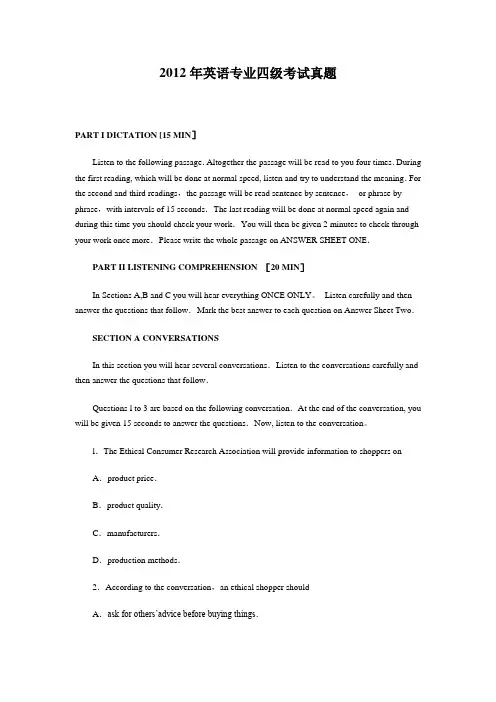
2012年英语专业四级考试真题PART I DICTATION [15 MIN]Listen to the following passage.Altogether the passage will be read to you four times.During the first reading, which will be done at normal speed, listen and try to understand the meaning.For the second and third readings,the passage will be read sentence by sentence,or phrase by phrase,with intervals of 15 seconds.The last reading will be done at normal speed again and during this time you should check your work.You will then be given 2 minutes to check through your work once more.Please write the whole passage on ANSWER SHEET ONE.PART II LISTENING COMPREHENSION [20 MIN]In Sections A,B and C you will hear everything ONCE ONLY。
Listen carefully and then answer the questions that follow.Mark the best answer to each question on Answer Sheet Two.SECTION A CONVERSATIONSIn this section you will hear several conversations.Listen to the conversations carefully and then answer the questions that follow.Questions l to 3 are based on the following conversation.At the end of the conversation, you will be given 15 seconds to answer the questions.Now, listen to the conversation。
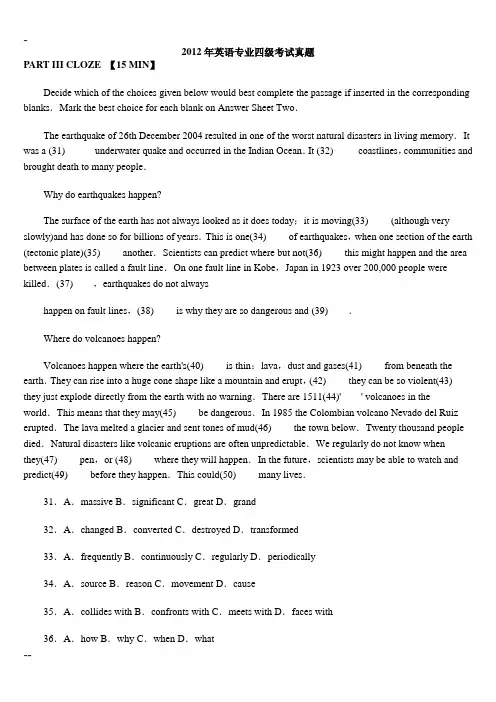
2012年英语专业四级考试真题PART III CLOZE 【15 MIN】Decide which of the choices given below would best complete the passage if inserted in the corresponding blanks.Mark the best choice for each blank on Answer Sheet Two.The earthquake of 26th December 2004 resulted in one of the worst natural disasters in living memory.It was a (31) _____ underwater quake and occurred in the Indian Ocean.It (32) ____ coastlines,communities and brought death to many people.Why do earthquakes happen?The surface of the earth has not always looked as it does today;it is moving(33)____ (although very slowly)and has done so for billions of years.This is one(34)____ of earthquakes,when one section of the earth (tectonic plate)(35)____ another.Scientists can predict where but not(36)____ this might happen and the area between plates is called a fault line.On one fault line in Kobe,Japan in 1923 over 200,000 people were killed.(37)____,earthquakes do not alwayshappen on fault lines,(38)____ is why they are so dangerous and (39)____.Where do volcanoes happen?Volcanoes happen where the earth's(40)____ is thin:lava,dust and gases(41)____ from beneath the earth.They can rise into a huge cone shape like a mountain and erupt,(42)____ they can be so violent(43)____ they just explode directly from the earth with no warning.There are 1511(44)'____' volcanoes in the world.This means that they may(45)____ be dangerous.In 1985 the Colombian volcano Nevado del Ruiz erupted.The lava melted a glacier and sent tones of mud(46)____ the town below.Twenty thousand people died.Natural disasters like volcanic eruptions are often unpredictable.We regularly do not know whenthey(47)____ pen,or (48)____ where they will happen.In the future,scientists may be able to watch and predict(49)____ before they happen.This could(50)____ many lives.31.A.massive B.significant C.great D.grand32.A.changed B.converted C.destroyed D.transformed33.A.frequently B.continuously C.regularly D.periodically34.A.source B.reason C.movement D.cause35.A.collides with B.confronts with C.meets with D.faces with36.A.how B.why C.when D.what37.A.Generally B.However C.Similarly D.Anyway38.A.that B.it C.this D.which39.A.unpredictable B.unaccountable C.inevitable D.irresistible40.A.surface B.appearance C.crust D.cover41.A.flowed out B.burst out C.1eaked out D.trickled out42.A.or B.and C.nor D.but43.A.like B.for C.as D.that44.A.living B.active C.alive D.live45.A.relatively B.hardly C.still D.gradually46.A.down B.on C.across D.beyond47.A.are to B.should C.must D.might48.A.else B.even C.though D.whether49.A.accidents B.incidents C.occasions D.events50.A.rescue B.save C.preserve D.shelterPART IV GRAMMAR &VOCABULARY 【15 MIN】There are thirty sentences in this section.Beneath each sentence there are four words, phrases or statements marked A,B, C and D.Choose one word, phrase or statement that best completes the sentence.Mark your answers on Answer Sheet Two.51.Which of the following sentences is INCORRECT?A.Twenty miles seems like a long walk to him.B.No one except his supporters agree with him.C.Neither Julia nor I were going to the party.D.Few students in my class are really lazy.52.Which of the following determiners(限定词)can be placed before both singular count nouns and plural count nouns?A.many a B.few C.such D.the next53.Which of the following reflexive pronouns(反身代词)is used as an appositive(同位语)?A,He promised himself rapid progress.B.The manager herself will interview Mary.C.I have nothing to say for myself.D.They quarreled themselves red in the face.54.My boss ordered that the legal documents ____ to him before lunch.A.be sent B.were sent C.were to be sent D.must be sent55.Which of the following sentences expresses WILLINGNESS?A.By now she will be eating dinner.B.I shall never do that again.C.My brother will help you with the luggage.D.You shall get a promotion.56.Which of the following sentences is INCORRECT?A.How strange feelings they are!B.How dare you speak to me like that!C.What noise they are making!D. What a mess we are in!57.which of the italicized parts functions as a subject?A.We never doubt that her brother is honest.B.The problem is not who will go but who will stay.C.You must give it back to whoever it belongs to。
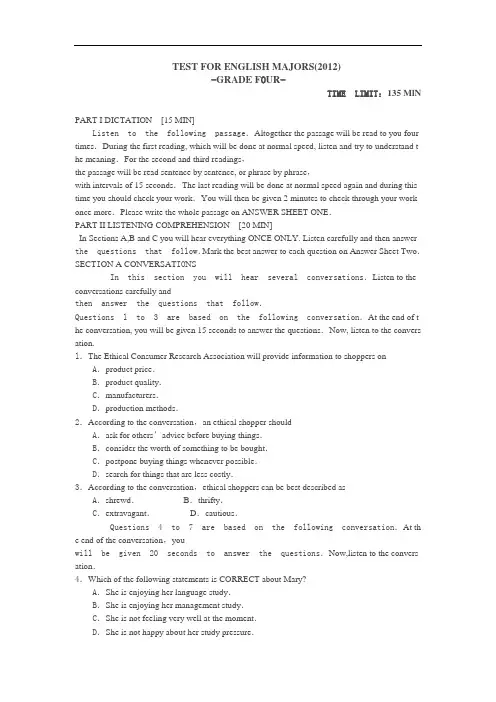
TEST FOR ENGLISH MAJORS(2012)-GRADE F O UR-TIME LIMIT:135 MlNPART I DICTATION [15 MIN]Listen to the following passage.Altogether the passage will be read to you four times .During the first reading, which will be done at normal speed, listen and try to understand the me aning.For the second and third readings,the passage will be read sentence by sentence, or phrase by phrase,with intervals of 15 seconds.The last reading will be done at normal speed again and during this time you should check your work.You will then be given 2 minutes to check through your work once more.Please write the whole passage on ANSWER SHEET ONE.PART II LISTENING COMPREHENSION [20 MIN]In Sections A,B and C you will hear everything ONCE ONLY. Listen carefully and then answer the questions that follow.Mark the best answer to each question on Answer Sheet Two.SECT I ON A CONVERSAT IO NSIn this section you will hear several conversations.Listen to the conversations carefully andthen answer the questions that follow.Questions l to 3 are based on the following conversation.At the end of the conversa tion, you will be given 15 seconds to answer the questions.Now, listen to the conversation. l.The Ethical Consumer Research Association will provide information to shoppers onA.product price.B.product quality.C.manufacturers.D.production methods.2.According to the conversation,an ethical shopper shouldA.ask for others’advice before buying things.B.consider the worth of something to be bought.C.postpone buying things whenever possible.D.search for things that are less costly.3.According to the conversation,ethical shoppers can be best described asA.shrewd.B.thrifty.C.extravagant.D.cautious.Questions 4 to 7 are based on the following conversation.At the end of the con versation,youwill be given 20 seconds to answer the questions.Now,listen to the conversation.4.Which of the following statements is CORRECT about Mary?A.She is enjoying her language study.B.She is enjoying her management study.C.She is not feeling very well at the moment.D.She is not happy about her study pressure.5.What does Mary think of the course initially?A.It is useful.B.It is difficult.C.It is challenging.D.It is interesting.6.What is Mary’s problem of living in a family house?A.She dislikes the food she eats.B.She is unable to sleep well.C.She has no chance to make friends.D.She finds the rent high.7.Which of the following is Mr.Davies’advice?A.To tryto make more friends.B.To try to change accommodation.C.To spend more time on English.D.To stop attending language classes.Questions 8 to 10 are based on the following conversation.At the end of the co nversation,youwill be given 15 seconds to answer the questions.Now,listen to the conversation.8.According to the conversation,the day is special becauseA.many people are surfing the net on that day.B.it is an anniversary of the internet.C.the net brought about no changes until that day.D.big changes will take place on that day.9.We learn from the conversation that peopleA.cannot Jive without the internet.B.cannot work without the internet.C.all use the internet to keep in touch.D.have varied opinions about internet use.10.At the end of the conversation.the speakers talk aboutA.the future of the internet.B.the type of office furniture.C.when changes will come.D.how people will use the internet.SECTION B PASSAGESIn this section,you will hear several passages.Listen to the passages carefully and then answer the questions tha t follow.Questions 11 to 13 are based on the following passage.At the end of the passage, you will be given 15 seconds to answer the questions.Now, listen to the passage.11.In order to open a bank account,you need to produce____in addition to your passport.A.a library card B.a registration formC.a telephone bill D.a receipt12.Which of the following might NOT be included in the‘utility bill’?A.Rent.B.Gas.C.Water.D.Telephone.13.According to the passage,what can one do in the post office?A.Getting contact details.B.Obtaining tax forms.C.Paying housing rents.D.Applying for loans.Questions 14 to 17 are based on the following passage.At the end of the passag e, you will be given 20 seconds to answer the questions.Now, listen to the passage.14.According to the passage,‘scheduling’means that youA.need to be efficient in work.B.plan your work properly.C.try to finish work ahead of time.D.know how to work in teams.15.According to the passage, one of the activities to relax could beA.protecting wild animals.B.spending time with your family.C.learning how to read efficiently.D.learning how to do gardening.16.One of the ways to reduce stress is toA.do better than anyone else.B.fulfill high ambitions in one's work.C.work and have reasonable aims.D.start with a relatively low aim.17.According to the passage,to reduce stress has something to do with the following EXCEPT A.one's position.B.one's interest.C.one's health.D.one's mood.Questions 18 to 20 are based on the following passage.At the end of the passag e, you will begiven 15 seconds to answer the questions.Now, listen to the passage.18.According to the passage,new words tend to come fromA.world politics.B.advances in science.C.areas of life.D.all the above.19.The passage explains the larger and richer vocabulary of English mainly from a viewpoint. A.historical B.culturalC.commercial D.colonial20.According to the passage,which of the following statements best describes the Englishlanguage?A.It is outdated in grammar.B.It accepts new words from science.C.It has begun taking in new words.D.It tends to embrace new words.SECTI O N C NEWS BROADCASTIn this section,you will hear several news items.Listen to them carefully and then answer thequestions that follow.Questions 21 and 22 are based OH the following news.At the end of the news item,you will begiven 10 seconds to answer the questions.Now listen to the news.21.Where was the marble statue found?A.Out in the sea.B.Inside a bath house.C.On a cliff along the coast.D.On the coast outside Jerusalem.22.Which of the following best describes the condition of the statue?A.It was incomplete.B.It was recent artwork.C.It was fairly tall.D.It was in pieces.Questions 23 and 24 are based on the following news.At the end of the news ite m.you will be given 10 seconds to answer the questions.Now, listen to the news.23.The rescue efforts concentrated mainly onA.the U.S.-Canada border B.snow-stricken regions.C.highways.D.city streets.24.According to the news,the last group of people might have been stranded in their vehiclesfor more than ____ hours before being rescued.A.24 B.25 C.40 D.48Questions 25 and 26 are based on the following news.At the end of the news item, you will begiven 10 seconds to answer the questions.Now, listen to the news.25.According to the 2006 anti-smoking restrictions,smoking was NOT allowed inA.offices.B.restaurants.C.bars.D.school playgrounds.26.According to the news,which of the following groups reacts negatively to the new law?A.Television producers.B.Hotel owners.C.Medical workers.D.Hospital management.Questions 27 and 28 are based on the following news.At the end of the news item,you will begiven 10 seconds to answer the questions.Now, listen to the news.27.According to the news,who first discovered the fraud?A.A client.B.A bank manager.C.The police.D.Bank headquarters.28.When did the bank employee hand himself in?A.A month before the fraud was discovered.B.A day before the fraud was discovered.C.A day after the police launched investigation.D.A month after he transferred the money.Question 29 is based on the following news.At the end of the news item, you will be given 5 seconds to answer the question.Now, listen to the news.29.What is this news item mainly about?A.How to open Hotmail accounts.B.How to retrieve missing e-mails.C.New e-mail service by Microsoft.D.Problems and complaints about e-mails.Question30 is based on the following news.At the end of the news item, you will be given 5 seconds to answer the question.Now, listen to the news.30.Compared with 2009,which of the following figures remained about the same in 2010?A.Number of tickets sold.B.Box office revenues.C.Attendance rate. D Number of cinemas.PART III CLOZE 【15 MIN】Decide which of the choices given below would best complete the passage if inserted in the cor responding blanks.Mark the best choice for each blank on Answer Sheet Two.The earthquake of 26th December 2004 resulted in one of the worst natural disasters in living memory.It was a (31) _____ underwater quake and occurred in the Indian Ocean.It (32 ) ____ coastlines,communities and brought death to many people.Why do earthquakes happen?The surface of the earth has not always looked as it does today;it is moving(33)____ (although very slowly)and has done so for billions of years.This is on e(34)____ of earthquakes,when one section of the earth (tectonic plate)(35)____ another.Scientists can predict where but n ot(36)____ this might happen and the area between plates is called a fault line.On one fault line in Kobe,Japan in 1923 over 200,000 people were killed.(37)____,earthquakes do not alwayshappen on fault lines,(38)____ is why they are so dangerous and (39)____.Where do volcanoes happen?Volcanoes happen where the earth's(40)____ is thin:lava,dust and gases(41)____ from beneath the earth.They can rise into a huge cone shape like a moun tain and erupt,(42)____ they can be so violent(43)____ they just explode directly from the earth with no warni ng.There are 1511(44)'____' volcanoes in the world.This means that they may(45)____ be dan gerous.In 1985 the Colombian volcano Nevado del Ruiz erupted.The lava melted a glacier and sent tones of mud(46)____ the town below.Twenty thousand people died.Natural disasters lik e volcanic eruptions are often unpredictable.We regularly do not know when they(47)____ pen,or (48)____ where they will happen.In the future,scientists may be able to watch and predict(49)____ before they happen.This could(50)____ ma ny lives.31.A.massive B.significant C.great D.grand32.A.changed B.converted C.destroyed D.transformed33.A.frequently B.continuously C.regularly D.periodically34.A.source B.reason C.movement D.cause35.A.collides with B.confronts with C.meets with D.faces with36.A.how B.why C.when D.what37.A.Generally B.However C.Similarly D.Anyway38.A.that B.it C.this D.which39.A.unpredictable B.unaccountable C.inevitable D.irresistible40.A.surface B.appearance C.crust D.cover41.A.flowed out B.burst out C.1eaked out D.trickled out42.A.or B.and C.nor D.but43.A.like B.for C.as D.that44.A.living B.active C.alive D.live45.A.relatively B.hardly C.still D.gradually46.A.down B.on C.across D.beyond47.A.are to B.should C.must D.might48.A.else B.even C.though D.whether49.A.accidents B.incidents C.occasions D.events50.A.rescue B.save C.preserve D.shelterPART IV GRAMMAR &VOCABULARY 【15 MIN】There are thirty sentences in this section.Beneath each sentence there are four wor ds, phrasesor statements marked A,B, C and D.Choose one word, phrase or statement that best completes the sentence.Mark your answers on Answer Sheet Two.51.Which of the following sentences is INCORRECT?A.Twenty miles seems like a long walk to him.B.No one except his supporters agree with him.C.Neither Julia nor I were going to the party.D.Few students in my class are really lazy.52.Which of the following determiners(限定词)can be placed before both singular countnouns and plural count nouns?A.many a B.few C.such D.the next53.Which of the following reflexive pronouns(反身代词)is used as an appositive(同位语)?A,He promised himself rapid progress.B.The manager herself will interview Mary.C.I have nothing to say for myself.D.They quarreled themselves red in the face.54.My boss ordered that the legal documents ____ to him before lunch.A.be sent B.were sent C.were to be sent D.must be sent55.Which of the following sentences expresses WILLINGNESS?A.By now she will be eating dinner.B.I shall never do that again.C.My brother will help you with the luggage.D.You shall get a promotion.56.Which of the following sentences is INCORRECT?A.How strange feelings they are!B.How dare you speak to me like that!C.What noise they are making!D. What a mess we are in!57.which of the italicized parts functions as a subject?A.We never doubt that her brother is honest.B.The problem is not who will go but who will stay.C.You must give it back to whoever it belongs to。
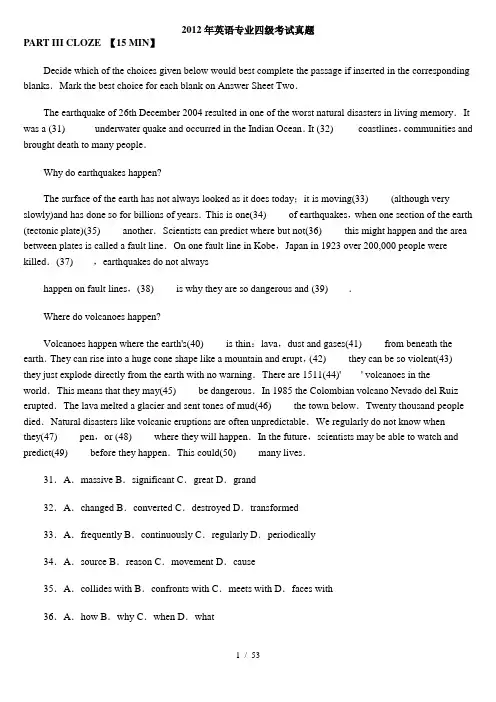
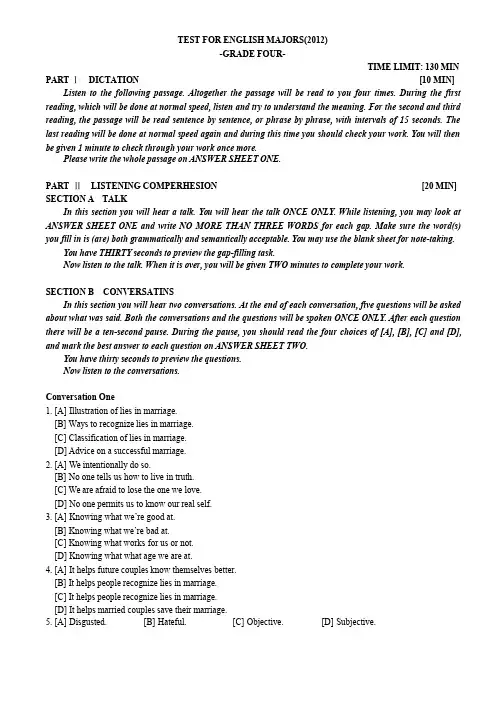
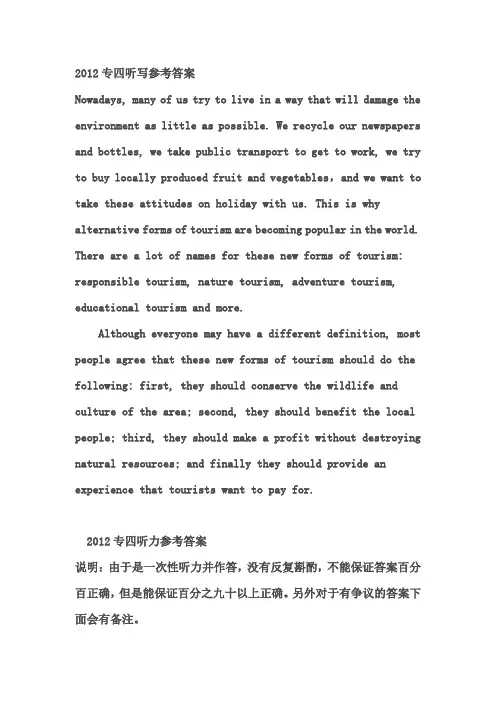
2012专四听写参考答案Nowadays, many of us try to live in a way that will damage the environment as little as possible. We recycle our newspapers and bottles, we take public transport to get to work, we try to buy locally produced fruit and vegetables,and we want to take these attitudes on holiday with us. This is why alternative forms of tourism are becoming popular in the world. There are a lot of names for these new forms of tourism: responsible tourism, nature tourism, adventure tourism, educational tourism and more.Although everyone may have a different definition, most people agree that these new forms of tourism should do the following: first, they should conserve the wildlife and culture of the area; second, they should benefit the local people; third, they should make a profit without destroying natural resources; and finally they should provide an experience that tourists want to pay for.2012专四听力参考答案说明:由于是一次性听力并作答,没有反复斟酌,不能保证答案百分百正确,但是能保证百分之九十以上正确。
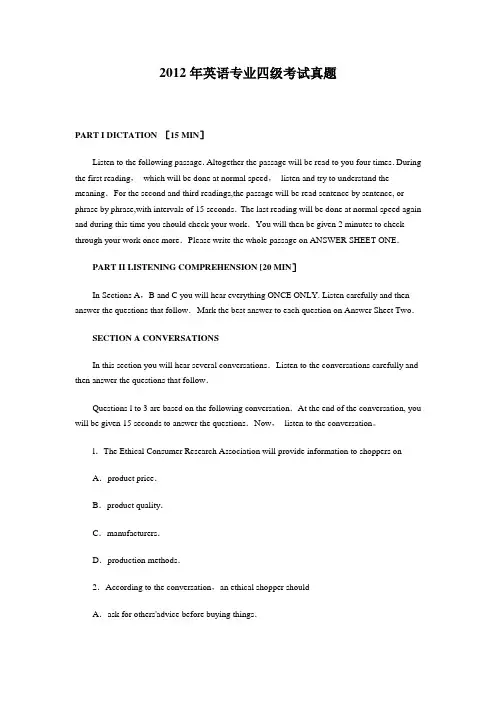
2012年英语专业四级考试真题PART I DICTATION [15 MIN]Listen to the following passage.Altogether the passage will be read to you four times.During the first reading,which will be done at normal speed,listen and try to understand the meaning.For the second and third readings,the passage will be read sentence by sentence, or phrase by phrase,with intervals of 15 seconds.The last reading will be done at normal speed again and during this time you should check your work.You will then be given 2 minutes to check through your work once more.Please write the whole passage on ANSWER SHEET ONE.PART II LISTENING COMPREHENSION [20 MIN]In Sections A,B and C you will hear everything ONCE ONLY. Listen carefully and then answer the questions that follow.Mark the best answer to each question on Answer Sheet Two.SECTION A CONVERSATIONSIn this section you will hear several conversations.Listen to the conversations carefully and then answer the questions that follow.Questions l to 3 are based on the following conversation.At the end of the conversation, you will be given 15 seconds to answer the questions.Now,listen to the conversation。
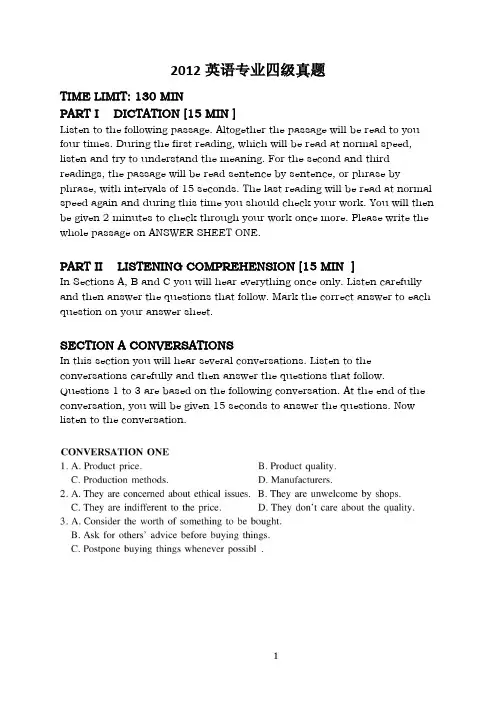
2012英语专业四级真题TIME LIMIT: 130 MINPART I DICTATION [15 MIN ]Listen to the following passage. Altogether the passage will be read to you four times. During the first reading, which will be read at normal speed, listen and try to understand the meaning. For the second and third readings, the passage will be read sentence by sentence, or phrase by phrase, with intervals of 15 seconds. The last reading will be read at normal speed again and during this time you should check your work. You will then be given 2 minutes to check through your work once more. Please write the whole passage on ANSWER SHEET ONE.PART II LISTENING COMPREHENSION [15 MIN ]In Sections A, B and C you will hear everything once only. Listen carefully and then answer the questions that follow. Mark the correct answer to each question on your answer sheet.SECTION A CONVERSATIONSIn this section you will hear several conversations. Listen to the conversations carefully and then answer the questions that follow. Questions 1 to 3 are based on the following conversation. At the end of the conversation, you will be given 15 seconds to answer the questions. Now listen to the conversation.。

2012年英语专四真题及答案PART III CLOZE 【15 MIN】Decide which of the choices given below would best complete the passage if inserted in the corresponding blanks. Mark the best choice for each blank on Answer Sheet Two.The earthquake of 26th December 2004 resulted in one of the worst natural disasters in living memory. It was a (31) _____ underwater quake and occurred in the Indian Ocean. It (32) ____ coastlines,communities and brought death to many people.Why do earthquakes happen?The surface of the earth has not always looked as it does today; it is moving(33)____ (although very slowly)and has done so for billions ofyears. This is one(34)____ of earthquakes,when one section of the earth (tectonic plate)(35)____ another. Scientists can predict where but not(36)____ this might happen and the area between plates is called a fault line. On one fault line in Kobe,Japan in 1923 over 200,000 people were killed.(37)____,earthquakes do not always happen on fault lines,(38)____ is why they are so dangerous and (39)____.Where do volcanoes happen?Volcanoes happen where the earth's(40)____ is thin:lava,dust and gases(41)____ from beneath the earth. They can rise into a huge cone shape like a mountain and erupt,(42)____ they can be so violent(43)____ they just explode directly from the earth with no warning. There are 1511(44)'____' volcanoes inthe world. This means that they may(45)____ be dangerous. In 1985 the Colombian volcanoNevado del Ruiz erupted. The lava melted a glacier and sent tones of mud(46)____ the town below. Twenty thousand people died. Natural disasters like volcanic eruptions are often unpredictable. We regularly do not know when they(47)____ pen,or (48)____ where they will happen. In the future,scientists may be able to watch and predict(49)____ before they happen.This could(50)____ many lives.31.A.massive B.significant C.greatD.grand32.A.changed B.converted C.destroyedD.transformed33.A.frequently B.continuouslyC.regularlyD.periodically34.A.source B.reason C.movementD.cause35.A.collides with B.confronts withC.meets withD.faces with36.A.how B.why C.when D.what37.A.Generally B.However C.SimilarlyD.Anyway38.A.that B.it C.this D.which39.A.unpredictable B.unaccountableC.inevitableD.irresistible40.A.surface B.appearance C.crustD.cover41.A.flowed out B.burst out C.1eaked outD.trickled out42.A.or B.and C.nor D.but43.A.like B.for C.as D.that44.A.living B.active C.alive D.live45.A.relatively B.hardly C.stillD.gradually46.A.down B.on C.across D.beyond47.A.are to B.should C.must D.might48.A.else B.even C.though D.whether49.A.accidents B.incidents C.occasionsD.events50.A.rescue B.save C.preserve D.shelter2012年英语专四完形填空答案31) massive32) destroyed33) continuously34) cause35) collides with36) when37) However38) which39) unpredictable40) crust41) burst out42) or43) that44) active45) still46) down47) might48) even49) events50) savePART IV GRAMMAR &VOCABULARY 【15 MIN】There are thirty sentences in this section. Beneath each sentence there are four words, phrases or statements marked A,B, C and D.Choose one word, phrase or statement that best completes the sentence. Mark your answers on Answer Sheet Two.51.Which of the following sentences is INCORRECT?A.Twenty miles seems like a long walk to him.B.No one except his supporters agree with him.C.Neither Julia nor I were going to the party.D.Few students in my class are really lazy.52.Which of the following determiners(限定词)can be placed beforeboth singular count nouns and plural count nouns?A.many aB.fewC.suchD.the next53.Which of the following reflexive pronouns(反身代词)is used as an appositive(同位语)?A,He promised himself rapid progress.B.The manager herself will interview Mary.C.I have nothing to say for myself.D.They quarreled themselves red in the face.54.My boss ordered that the legal documents ____ to him beforelunch.A.be sentB.were sentC.were to be sentD.must be sent55.Which of the following sentences expresses WILLINGNESS?A.By now she will be eating dinner.B.I shall never do that again.C.My brother will help you with the luggage.D.You shall get a promotion.56.Which of the following sentences is INCORRECT?A.How strange feelings they are!B.How dare you speak to me like that!C.What noise they are making!D. What a mess we are in!57.which of the italicized parts functions as a subject?A.We never doubt that her brother is honest.B.The problem is not who will go but who will stay.C.You must give it back to whoever it belongs to。
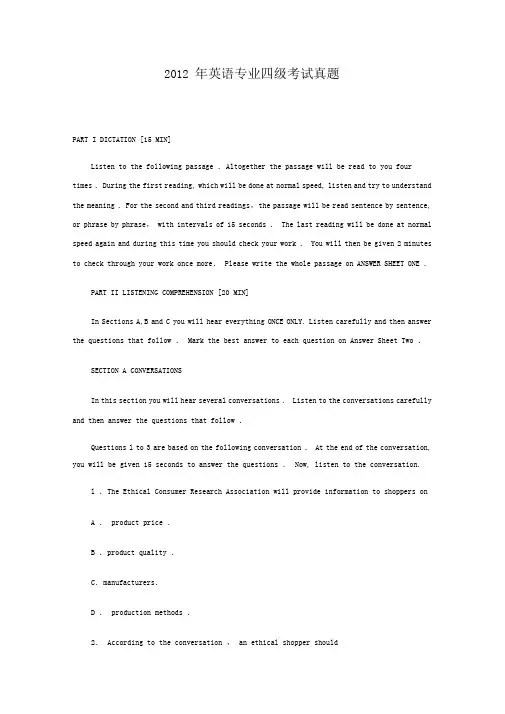
2012 年英语专业四级考试真题PART I DICTATION [15 MIN]Listen to the following passage .Altogether the passage will be read to you four times .During the first reading, which will be done at normal speed, listen and try to understand the meaning .For the second and third readings,the passage will be read sentence by sentence, or phrase by phrase,with intervals of 15 seconds .The last reading will be done at normal speed again and during this time you should check your work .You will then be given 2 minutes to check through your work once more.Please write the whole passage on ANSWER SHEET ONE .PART II LISTENING COMPREHENSION [20 MIN]In Sections A,B and C you will hear everything ONCE ONLY. Listen carefully and then answer the questions that follow .Mark the best answer to each question on Answer Sheet Two .SECTION A CONVERSATIONSIn this section you will hear several conversations .Listen to the conversations carefully and then answer the questions that follow .Questions l to 3 are based on the following conversation .At the end of the conversation, you will be given 15 seconds to answer the questions .Now, listen to the conversation.l .The Ethical Consumer Research Association will provide information to shoppers onA .product price .B .product quality .C.manufacturers.D .production methods .2.According to the conversation ,an ethical shopper shouldA .ask for others 'advice before buying thi.ngsB .consider the worth of something to be bought .C.postpone buying things whenever possible .D.search for things that are less costly .3.According to the conversation ,ethical shoppers can be best described asA .shrewd.B .thrifty .C.extravagant.D.cautious.Questions 4 to 7 are based on the following conversation .At the end of the conversation ,you will be given 20 seconds to answer the questions .Now,listen to the conversation .4.Which of the following statements is CORRECT about Mary?A .She is enjoying her language study .B.She is enjoying her management study .C.She is not feeling very well at the moment .D.She is not happy about her study pressure.5.What does Mary think of the course initially?A .It is useful .B .It is difficult .C.It is challenging . D .It is interesting .6.What is Mary 's problem of living in a family house?A .She dislikes the food she eats.B .She is unable to sleep well .C.She has no chance to make friends.D.She finds the rent high .7.Which of the following is Mr .Davies 'advice?A .To tryto make more friends .B .To try to change accommodation .C.To spend more time on English .D.To stop attending language classes.Questions 8 to 10 are based on the following conversation .At the end of the conversation ,you will be given 15 seconds to answer the questions .Now,listen to the conversation .8.According to the conversation ,the day is special becauseA .many people are surfing the net on that day .B .it is an anniversary of the internet .C.the net brought about no changes until that day .D.big changes will take place on that day .9.We learn from the conversation that peopleA .cannot Jive without the internet .B .cannot work without the internet .C.all use the internet to keep in touch .D.have varied opinions about internet use .10.At the end of the conversation .the speakers talk aboutA .the future of the internet .B .the type of office furniture .C.when changes will come .D.how people will use the internet .SECTION B PASSAGESIn this section ,you will hear several passages.Listen to the passages carefully and then answer the questions that follow .Questions 11 to 13 are based on the following passage .At the end of the passage, you will be given 15 seconds to answer the questions.Now, listen to the passage .11.In order to open a bank account,you need to produce in addition to your passport .A . a library cardB . a registration formC.a telephone bill D . a receipt12.Which of the following might NOT be included in the ‘utility bill '?A .Rent.B.Gas. C .Water . D .Telephone.13.According to the passage,what can one do in the post office?A .Getting contact details .B .Obtaining tax forms .C.Paying housing rents . D .Applying for loans .Questions 14 to 17 are based on the following passage .At the end of the passage, you will be given 20 seconds to answer the questions.Now, listen to the passage .14.According to the passage,‘scheduling 'means that youA .need to be efficient in work .B .plan your work properly .C.try to finish work ahead of timeD.know how to work in teams .15.According to the passage, one of the activities to relax could beA .protecting wild animals .B .spending time with your family .C.learning how to read efficiently .D.learning how to do gardening .16.One of the ways to reduce stress is toA .do better than anyone else.B .fulfill high ambitions in one's work .C.work and have reasonable aims .D.start with a relatively low aim .17.According to the passage,to reduce stress has something to do with the following EXCEPTA .one's position.B .one's interest.C.one's health.D.one's mood.Questions 18 to 20 are based on the following passage .At the end of the passage, you will be given 15 seconds to answer the questions.Now, listen to the passage .18.According to the passage,new words tend to come fromA .world politics .B.advances in science.C.areas of life .D.all the above.19.The passage explains the larger and richer vocabulary of English mainly from a viewpoint .A .historicalB .culturalC.commercial D .colonial20.According to the passage,which of the following statements best describes the English language?A .It is outdated in grammar .B .It accepts new words from science .C.It has begun taking in new words .。
2012英语专业四级考试真题PART I DICTATION [15 MIN]Listen to the following passage.Altogether the passage will be read to you four times.During the first reading, which will be done at normal speed, listen and try to understand the meaning.For the second and third readings,the passage will be read sentence by sentence, or phrase by phrase,with intervals of 15 seconds.The last reading will be done at normal speed again and during this time you should check your work.You will then be given 2 minutes to check through your work once more.Please write the whole passage on ANSWER SHEET ONE.PART II LISTENING COMPREHENSION [20 MIN]In Sections A,B and C you will hear everything ONCE ONLY. Listen carefully and then answer the questions that follow.Mark the best answer to each question on Answer Sheet Two.SECTION A CONVERSATIONSIn this section you will hear several conversations.Listen to the conversations carefully and then answer the questions that follow.Questions l to 3 are based on the following conversation.At the end of the conversation, you will be given 15 seconds to answer the questions.Now, listen to the conversation.l.The Ethical Consumer Research Association will provide information to shoppers onA.product price.B.product quality.C.manufacturers.D.production methods.2.According to the conversation,an ethical shopper shouldA.ask for others’advice before buying things.B.consider the worth of something to be bought.C.postpone buying things whenever possible.D.search for things that are less costly.3.According to the conversation,ethical shoppers can be best described as A.shrewd. B.thrifty.C.extravagant. D.cautious.Questions 4 to 7 are based on the following conversation.At the end of the conversation,you will be given 20 seconds to answer the questions.Now,listen to the conversation.4.Which of the following statements is CORRECT about Mary?A.She is enjoying her language study.B.She is enjoying her management study.C.She is not feeling very well at the moment.D.She is not happy about her study pressure.5.What does Mary think of the course initially?A.It is useful. B.It is difficult.C.It is challenging. D.It is interesting.6.What is Mary’s problem of living in a family house?A.She dislikes the food she eats. B.She is unable to sleep well.C.She has no chance to make friends. D.She finds the rent high.7.Which of the following is Mr.Davies’advice?A.To tryto make more friends.B.To try to change accommodation.C.To spend more time on English.D.To stop attending language classes.Questions 8 to 10 are based on the following conversation.At the end of the conversation,you will be given 15 seconds to answer the questions.Now,listen to the conversation.8.According to the conversation,the day is special becauseA.many people are surfing the net on that day.B.it is an anniversary of the internet.C.the net brought about no changes until that day.D.big changes will take place on that day.9.We learn from the conversation that peopleA.cannot Jive without the internet.B.cannot work without the internet.C.all use the internet to keep in touch.D.have varied opinions about internet use.10.At the end of the conversation.the speakers talk aboutA.the future of the internet.B.the type of office furniture.C.when changes will come.D.how people will use the internet.SECTION B PASSAGESIn this section,you will hear several passages.Listen to the passages carefully and then answer the questions that follow.Questions 11 to 13 are based on the following passage.At the end of the passage, you will be given 15 seconds to answer the questions.Now, listen to the passage.11.In order to open a bank account,you need to produce____in addition to your passport.A.a library card B.a registration formC.a telephone bill D.a receipt12.Which of the following might NOT be included in the‘utility bill’?A.Rent. B.Gas. C.Water. D.Telephone.13.According to the passage,what can one do in the post office?A.Getting contact details. B.Obtaining tax forms.C.Paying housing rents. D.Applying for loans.Questions 14 to 17 are based on the following passage.At the end of the passage, you will be given 20 seconds to answer the questions.Now, listen to the passage.14.According to the passage,‘scheduling’means that youA.need to be efficient in work.B.plan your work properly.C.try to finish work ahead of time.D.know how to work in teams.15.According to the passage, one of the activities to relax could beA.protecting wild animals.B.spending time with your family.C.learning how to read efficiently.D.learning how to do gardening.16.One of the ways to reduce stress is toA.do better than anyone else.B.fulfill high ambitions in one's work.C.work and have reasonable aims.D.start with a relatively low aim.17.According to the passage,to reduce stress has something to do with the following EXCEPTA.one's position. B.one's interest.C.one's health. D.one's mood.Questions 18 to 20 are based on the following passage.At the end of the passage, you will be given 15 seconds to answer the questions.Now, listen to the passage.18.According to the passage,new words tend to come fromA.world politics. B.advances in science.C.areas of life. D.all the above.19.The passage explains the larger and richer vocabulary of English mainly from a viewpoint.A.historical B.culturalC.commercial D.colonial20.According to the passage,which of the following statements best describes the English language?A.It is outdated in grammar.B.It accepts new words from science.C.It has begun taking in new words.D.It tends to embrace new words.SECTION C NEWS BROADCASTIn this section,you will hear several news items.Listen to them carefully and then answer the questions that follow.Questions 21 and 22 are based OH the following news.At the end of the news item,you will be given 10 seconds to answer the questions.Now listen to the news.21.Where was the marble statue found?A.Out in the sea. B.Inside a bath house.C.On a cliff along the coast. D.On the coast outside Jerusalem.22.Which of the following best describes the condition of the statue?A.It was incomplete. B.It was recent artwork.C.It was fairly tall. D.It was in pieces.Questions 23 and 24 are based on the following news.At the end of the news item.you will be given 10 seconds to answer the questions.Now, listen to the news.23.The rescue efforts concentrated mainly onA.the U.S.-Canada border B.snow-stricken regions.C.highways. D.city streets.24.According to the news,the last group of people might have been stranded in their vehiclesfor more than ____ hours before being rescued.A.24 B.25 C.40 D.48Questions 25 and 26 are based on the following news.At the end of the news item, you will be given 10 seconds to answer the questions.Now, listen to the news.25.According to the 2006 anti-smoking restrictions,smoking was NOT allowed inA.offices. B.restaurants. C.bars. D.school playgrounds.26.According to the news,which of the following groups reacts negatively to the new law?A.Television producers. B.Hotel owners.C.Medical workers. D.Hospital management.Questions 27 and 28 are based on the following news.At the end of the news item,you will be given 10 seconds to answer the questions.Now, listen to the news.27.According to the news,who first discovered the fraud?A.A client. B.A bank manager.C.The police. D.Bank headquarters.28.When did the bank employee hand himself in?A.A month before the fraud was discovered.B.A day before the fraud was discovered.C.A day after the police launched investigation.D.A month after he transferred the money.Question 29 is based on the following news.At the end of the news item, you will be given 5 seconds to answer the question.Now, listen to the news.29.What is this news item mainly about?A.How to open Hotmail accounts.B.How to retrieve missing e-mails.C.New e-mail service by Microsoft.D.Problems and complaints about e-mails.Question30 is based on the following news.At the end of the news item, you will be given 5 seconds to answer the question.Now, listen to the news.30.Compared with 2009,which of the following figures remained about the same in 2010?A.Number of tickets sold. B.Box office revenues.C.Attendance rate. D Number of cinemas.PART III CLOZE 【15 MIN】Decide which of the choices given below would best complete the passage if inserted in the corresponding blanks.Mark the best choice for each blank on Answer Sheet Two.The earthquake of 26th December 2004 resulted in one of the worst natural disasters in living memory.It was a (31) _____ underwater quake and occurred in the Indian Ocean.It (32) ____ coastlines,communities and brought death to many people.Why do earthquakes happen?The surface of the earth has not always looked as it does today;it is moving(33)____ (although very slowly)and has done so for billions of years.This is one(34)____ of earthquakes,when one section of the earth (tectonic plate)(35)____another.Scientists can predict where but not(36)____ this might happen and the area between plates is called a fault line.On one fault line in Kobe,Japan in 1923 over 200,000 people were killed.(37)____,earthquakes do not alwayshappen on fault lines,(38)____ is why they are so dangerous and (39)____.Where do volcanoes happen?Volcanoes happen where the earth's(40)____ is thin:lava,dust and gases(41)____ from beneath the earth.They can rise into a huge cone shape like a mountain and erupt,(42)____ they can be so violent(43)____ they just explode directly from the earth with no warning.There are 1511(44)'____' volcanoes in the world.This means that they may(45)____ be dangerous.In 1985 the Colombian volcano Nevado del Ruiz erupted.The lava melted a glacier and sent tones of mud(46)____ the town below.Twenty thousand people died.Natural disasters like volcanic eruptions are often unpredictable.We regularly do not know when they(47)____ pen,or (48)____ where they will happen.In the future,scientists may be able to watch and predict(49)____ before they happen.This could(50)____ many lives.31.A.massive B.significant C.great D.grand32.A.changed B.converted C.destroyed D.transformed33.A.frequently B.continuously C.regularly D.periodically34.A.source B.reason C.movement D.cause35.A.collides with B.confronts with C.meets with D.faces with36.A.how B.why C.when D.what37.A.Generally B.However C.Similarly D.Anyway38.A.that B.it C.this D.which39.A.unpredictable B.unaccountable C.inevitable D.irresistible40.A.surface B.appearance C.crust D.cover41.A.flowed out B.burst out C.1eaked out D.trickled out42.A.or B.and C.nor D.but43.A.like B.for C.as D.that44.A.living B.active C.alive D.live45.A.relatively B.hardly C.still D.gradually46.A.down B.on C.across D.beyond47.A.are to B.should C.must D.might48.A.else B.even C.though D.whether49.A.accidents B.incidents C.occasions D.events50.A.rescue B.save C.preserve D.shelterPART IV GRAMMAR &VOCABULARY 【15 MIN】There are thirty sentences in this section.Beneath each sentence there are fourwords, phrases or statements marked A,B, C and D.Choose one word, phrase or statement that best completes the sentence.Mark your answers on Answer Sheet Two.51.Which of the following sentences is INCORRECT?A.Twenty miles seems like a long walk to him.B.No one except his supporters agree with him.C.Neither Julia nor I were going to the party.D.Few students in my class are really lazy.52.Which of the following determiners(限定词)can be placed before both singular count nouns and plural count nouns?A.many a B.few C.such D.the next53.Which of the following reflexive pronouns(反身代词)is used as an appositive(同位语)?A,He promised himself rapid progress.B.The manager herself will interview Mary.C.I have nothing to say for myself.D.They quarreled themselves red in the face.54.My boss ordered that the legal documents ____ to him before lunch.A.be sent B.were sent C.were to be sent D.must be sent55.Which of the following sentences expresses WILLINGNESS?A.By now she will be eating dinner.B.I shall never do that again.C.My brother will help you with the luggage.D.You shall get a promotion.56.Which of the following sentences is INCORRECT?A.How strange feelings they are!B.How dare you speak to me like that!C.What noise they are making!D. What a mess we are in!57.which of the italicized parts functions as a subject?A.We never doubt that her brother is honest.B.The problem is not who will go but who will stay.C.You must give it back to whoever it belongs to。
2012年英语专业四级考试真题PART III CLOZE 【15 MIN】Decide which of the choices given below would best complete the passage if inserted in the corresponding blanks.Mark the best choice for each blank on Answer Sheet Two..It The earthquake of 26th December 2004 resulted in one of the worst natural disasters in living memory.It (32) ____ coastlines,communities and was a (31) _____ underwater quake and occurred in the Indian Oceanbrought death to many people.Why do earthquakes happen?;it is moving(33)____ (although very The surface of the earth has not always looked as it does todayslowly)and has done so for billions of years.This is one(34)____ of earthquakes,when one section of the earth (tectonic plate)(35)____ another.Scientists can predict where but not(36)____ this might happen and the area between plates is called a fault line.On one fault line in Kobe,Japan in 1923 over 200,000 people were killed.(37)____,earthquakes do not alwayshappen on fault lines,(38)____ is why they are so dangerous and (39)____.Where do volcanoes happen?Volcanoes happen where the earth's(40)____ is thin:lava,dust and gases(41)____ from beneath the,(42)____ they can be so violent(43)____ earth.They can rise into a huge cone shape like a mountain and eruptthey just explode directly from the earth with no warning.There are 1511(44)'____' volcanoes in the world.This means that they may(45)____ be dangerous.In 1985 the Colombian volcano Nevado del Ruiz erupted.The lava melted a glacier and sent tones of mud(46)____ the town below.Twenty thousand people died.Natural disasters like volcanic eruptions are often unpredictable.We regularly do not know whenthey(47)____ pen,or (48)____ where they will happen.In the future,scientists may be able to watch and predict(49)____ before they happen.This could(50)____ many lives.31.A.massive B.significant C.great D.grand32.A.changed B.converted C.destroyed D.transformed33.A.frequently B.continuously C.regularly D.periodically34.A.source B.reason C.movement D.cause35.A.collides with B.confronts with C.meets with D.faces with36.A.how B.why C.when D.what37.A.Generally B.However C.Similarly D.Anyway38.A.that B.it C.this D.which39.A.unpredictable B.unaccountable C.inevitable D.irresistible40.A.surface B.appearance C.crust D.cover41.A.flowed out B.burst out C.1eaked out D.trickled out42.A.or B.and C.nor D.but43.A.like B.for C.as D.that44.A.living B.active C.alive D.live45.A.relatively B.hardly C.still D.gradually46.A.down B.on C.across D.beyond47.A.are to B.should C.must D.might48.A.else B.even C.though D.whether49.A.accidents B.incidents C.occasions D.events50.A.rescue B.save C.preserve D.shelterPART IV GRAMMAR &VOCABULARY 【15 MIN】There are thirty sentences in this section.Beneath each sentence there are four words, phrases or statements marked A,B, C and D.Choose one word, phrase or statement that best completes the sentence.Mark your answers on Answer Sheet Two.51.Which of the following sentences is INCORRECT?A.Twenty miles seems like a long walk to him.B.No one except his supporters agree with him.C.Neither Julia nor I were going to the party.D.Few students in my class are really lazy.52.Which of the following determiners(限定词)can be placed before both singular count nouns and plural count nouns?A.many a B.few C.such D.the next53.Which of the following reflexive pronouns(反身代词)is used as an appositive(同位语)?A,He promised himself rapid progress.B.The manager herself will interview Mary.C.I have nothing to say for myself.D.They quarreled themselves red in the face.54.My boss ordered that the legal documents ____ to him before lunch.A.be sent B.were sent C.were to be sent D.must be sent55.Which of the following sentences expresses WILLINGNESS?A.By now she will be eating dinner.B.I shall never do that again.C.My brother will help you with the luggage.D.You shall get a promotion.56.Which of the following sentences is INCORRECT?A.How strange feelings they are!B.How dare you speak to me like that!C.What noise they are making!D. What a mess we are in!57.which of the italicized parts functions as a subject?A.We never doubt that her brother is honest.B.The problem is not who will go but who will stay.C.You must give it back to whoever it belongs to。
2012 年英语专业四级考试真题PART I DICTATION [15 MIN]Listen to the following passage .Altogether the passage will be read to you four times .During the first reading, which will be done at normal speed, listen and try to understand the meaning .Forthe second and third readings ,the passage will be read sentence by sentence, or phrase by phrase with intervals of 15 seconds .The last reading will be done at normal speed again and during this time you should check your work .You will then be given 2 minutes to check through your work once more .Please write the whole passage on ANSWER SHEET ONE .PART II LISTENING COMPREHENSION [20 MIN]In Sections A,B and C you will hear everything ONCE ONLY. Listen carefully and then answer the questions that follow .Mark the best answer to each question on Answer Sheet Two .SECTION A CONVERSATIONSIn this section you will hear several conversations .Listen to the conversations carefully andthen answer the questions that follow .Questions l to 3 are based on the following conversation .At the end of the conversation, youwill be given 15 seconds to answer the questions .Now, listen to the conversation.l .The Ethical Consumer Research Association will provide information to shoppers onA .product price .B.product quality .C .manufacturers .D .production methods .2 .According to the conversation ,an ethical shopper shouldA .ask for others?advice before buying thingsB.consider the worth of something to be boughtC .postpone buying things whenever possibleD .search for things that are less costly3 .According to the conversation ,ethical shoppers can be best described asA .shrewd .B .thrifty .C .extravagant .D.cautious .Questions 4 to 7 are based on the following conversation .At the end of the conversation you will be given 20 seconds to answer the questions .Now,listen to the conversation .4 .Which of the following statements is CORRECT about Mary?A .She is enjoying her language studyB.She is enjoying her management studyC .She is not feeling very well at the momentD .She is not happy about her study pressure5 .What does Mary think of the course initially?A .It is useful .B .It is difficultC.It is challenging . D .It is interesting6 .What is Mary?s problem of living in a family house?A .She dislikes the food she eats .B .She is unable to sleep wellC.She has no chance to make friends . D .She finds the rent high7 .Which of the following is Mr .Davies?advice?A .To tryto make more friendsB.To try to change accommodationC .To spend more time on EnglishD .To stop attending language classes .Questions 8 to 10 are based on the following conversation .At the end of the conversation you will be given 15 seconds to answer the questions .Now,listen to the conversation .8 .According to the conversation ,the day is special becauseA .many people are surfing the net on that day .B.it is an anniversary of the internet .C .the net brought about no changes until that day .D .big changes will take place on that day .9 .We learn from the conversation that peopleA .cannot Jive without the internet .B.cannot work without the internet .C .all use the internet to keep in touch .D .have varied opinions about internet use .10.At the end of the conversation .the speakers talk aboutA .the future of the internet .B.the type of office furniture .C .when changes will come .D .how people will use the internet .SECTION B PASSAGESIn this section ,you will hear several passages .Listen to the passages carefully and then answer the questions that follow .Questions 11 to 13 are based on the following passage.At the end of the passage, you willbe given 15 seconds to answer the questions .Now, listen to thepassage11 .In order to open a bank account ,you need to produce ____ in addition to your passportA . a library cardB . a registration formC . a telephone billD . a receipt 12.Which of the following might NOT be included in the,utility bill??A .Rent.B.Gas. C .Water . D .Telephone .13.According to the passage ,what can one do in the post office?A .Getting contact details .B .Obtaining tax formsC .Paying housing rents .D .Applying for loansQuestions 14 to 17 are based on the following passage .At the end of the passage, you willbe given 20 seconds to answer the questions .Now, listen to the passage .14.According to the passage ,,scheduling?means that youA .need to be efficient in workB.plan your work properlyC .try to finish work ahead of timeD .know how to work in teams15.According to the passage, one of the activities to relax could beA .protecting wild animalsB.spending time with your familyC .learning how to read efficientlyD.learning how to do gardening16.One of the ways to reduce stress is toA .do better than anyone else .B.fulfill high ambitions in one's work .C .work and have reasonable aims .D .start with a relatively low aim .17.According to the passage ,to reduce stress has something to do with the following EXCEPTA .one's position .B .one's interest .C.one's health . D .one's mood .Questions 18 to 20 are based on the following passage .At the end of the passage, you will be given 15 seconds to answer the questions .Now, listen to the passage .18.According to the passage ,new words tend to come fromA .world politics .B .advances in science .C.areas of life . D .all the above .19.The passage explains the larger and richer vocabulary of English mainly from a viewpoint .A .historicalB .culturalC .commercialD .colonial20.According to the passage ,which of the following statements best describes theEnglish language?A .It is outdated in grammar .B.It accepts new words from science .C.It has begun taking in new wordsD .It tends to embrace new words.SECTION C NEWS BROADCASTIn this section ,you will hear several news items .Listen to them carefully and then answer the questions that follow .Questions 21 and 22 are based OH the following news .At the end of the news item ,youwill be given 10 seconds to answer the questions .Now listen to the news .21.Where was the marble statue found?A .Out in the sea .B .Inside a bath house .C .On a cliff along the coast .D.On the coast outside Jerusalem .22.Which of the following best describes the condition of the statue?A .It was incomplete .B .It was recent artwork .C.It was fairly tall . D .It was in pieces .Questions 23 and 24 are based on the following news .At the end of the news item .you willbe given 10 seconds to answer the questions .Now, listen to the news .23.The rescue efforts concentrated mainly onA .the U .S .-Canada borderB .snow-stricken regions .C.highways . D .city streets .24.According to the news ,the last group of people might have been stranded in their vehicles for more than ___ hours before being rescued .A.24 B.25 C.40 D.48Questions 25 and 26 are based on the following news .At the end of the news item, you will be given 10 seconds to answer the questions .Now, listen to the news .25.According to the 2006 anti-smoking restrictions ,smoking was NOT allowed inA .offices .B.restaurants .C.bars . D .school playgrounds .26 .According to the news ,which of the following groups reacts negatively to the new law?A .Television producers .B .Hotel owners .C .Medical workers .D .Hospital management .Questions 27 and 28 are based on the following news .At the end of the news item ,you will be given 10 seconds to answer the questions .Now, listen to the news .27.According to the news ,who first discovered the fraud?A . A client .B . A bank manager .C .The police .D.Bank headquarters .28.When did the bank employee hand himself in?A . A month before the fraud was discovered .B. A day before the fraud was discovered .C . A day after the police launched investigation .D . A month after he transferred the money .Question 29 is based on the following news .At the end of the news item, you will be given 5 seconds to answer the question .Now, listen to the news .29.What is this news item mainly about?A .How to open Hotmail accounts .B.How to retrieve missing e-mails .C .New e-mail service by MicrosoftD .Problems and complaints about e-mailsQuestion30 is based on the following news .At the end of the news item, you will be given5 seconds to answer the question .Now, listen to the news .30.Compared with 2009 ,which of the following figures remained about the same in 2010?A .Number of tickets sold .B .Box office revenues .C .Attendance rate .D Number of cinemasPART III CLOZE 【15 MIN 】Decide which of the choices given below would best complete the passage if inserted in the corresponding blanks .Mark the best choice for each blank on Answer Sheet Two .The earthquake of 26th December 2004 resulted in one of the worst natural disasters in living memory .It was a (31) ____________________ underwater quake and occurred in the Indian Ocean .It (32) ____ coastlines ,communities and brought death to many people .Why do earthquakes happen?The surface of the earth has not always looked as it does today ;it is moving(33) ___(although very slowly)and has done so for billions of years .This is one(34) ___ of earthquakes ,when one section of the earth (tectonic plate)(35) ___ another .Scientists can predict where butnot(36) ___ this might happen and the area between plates is called a fault line .On one fault linein Kobe ,Japan in 1923 over 200,000 people were killed .(37) ___ ,earthquakes do not alwayshappen on fault lines ,(38) ____ is why they are so dangerous and (39) ___ .Where do volcanoes happen?Volcanoes happen where the earth's(40) ___ is thin :lava ,dust and gases(41) _ from beneath the earth .They can rise into a huge cone shape like a mountain and erupt ,(42) ___ they can be so violent(43) ___ they just explode directly from the earth with no warning .There are 1511(44)' ___ ' volcanoes in the world .This means that they may(45) _____ be dangerous .In 1985 the Colombian volcano Nevado del Ruiz erupted .The lava melted a glacier and sent tones ofmud(46) ___ the town below .Twenty thousand people died .Natural disasters like volcaniceruptions are often unpredictable .We regularly do not know when they(47) ___ pen ,or (48) ___ where they will happen .In the future ,scientists may be able to watch and predict(49) _____ beforethey happen .This could(50) ___ many lives .31. A .massive B .significant C .great D.grand32. A .changed B .converted C .destroyed D .transformed33. A .frequently B .continuously C .regularly D .periodically34. A .source B .reason C .movement D .cause35. A .collides with B .confronts with C .meets with D .faces with 36. A .how B .why C .when D .what37. A .Generally B .However C .Similarly D .Anyway38. A .that B .it C.this D .which39. A .unpredictable B .unaccountable C .inevitable D .irresistible 40. A .surface B.appearance C .crust D.cover41. A .flowed out B .burst out C .1eaked out D .trickled out42. A .or B.and C.nor D.but43. A .like B .for C.as D.that44. A .living B .active C .alive D .live45. A .relatively B .hardly C .still D .gradually46. A .down B .on C.across D .beyond47. A .are to B .should C .must D .might48. A .else B .even C .though D .whether49 . A .accidents B .incidents C .occasions D .events50. A .rescue B .save C .preserve D .shelterPART IV GRAMMAR &VOCABULARY 【15 MIN 】There are thirty sentences in this section .Beneath each sentence there are four words,phrases or statements marked A ,B, C and D .Choose one word, phrase or statement that best completes the sentence .Mark your answers on Answer Sheet Two .51.Which of the following sentences is INCORRECT?A .Twenty miles seems like a long walk to him .B.No one except his supporters agree with him .C .Neither Julia nor I were going to the party .D .Few students in my class are really lazy .52.Which of the following determiners(限定词)can be placed before both singular count nouns and plural count nouns?A .many aB .fewC .suchD .the next53.Which of the following reflexive pronouns(反身代词)is used as an appositive(同位语)?A ,He promised himself rapid progress .B.The manager herself will interview Mary .C .I have nothing to say for myself .D .They quarreled themselves red in the face .54.My boss ordered that the legal documents __ to him before lunch .A .be sentB .were sentC .were to be sentD .must be sent55.Which of the following sentences expresses WILLINGNESS?A .By now she will be eating dinnerB.I shall never do that again .C.My brother will help you with the luggage.D.You shall get a promotion .56.Which of the following sentences is INCORRECT?A.How strange feelings they are!B.How dare you speak to me like that!C.What noise they are making!D. What a mess we are in!57.which of the italicized parts functions as a subject?A.We never doubt that her brother is honest .B.The problem is not who will go but who will stay.C.You must give it back to whoever it belongs to。
矿产资源开发利用方案编写内容要求及审查大纲
矿产资源开发利用方案编写内容要求及《矿产资源开发利用方案》审查大纲一、概述
㈠矿区位置、隶属关系和企业性质。
如为改扩建矿山, 应说明矿山现状、
特点及存在的主要问题。
㈡编制依据
(1简述项目前期工作进展情况及与有关方面对项目的意向性协议情况。
(2 列出开发利用方案编制所依据的主要基础性资料的名称。
如经储量管理部门认定的矿区地质勘探报告、选矿试验报告、加工利用试验报告、工程地质初评资料、矿区水文资料和供水资料等。
对改、扩建矿山应有生产实际资料, 如矿山总平面现状图、矿床开拓系统图、采场现状图和主要采选设备清单等。
二、矿产品需求现状和预测
㈠该矿产在国内需求情况和市场供应情况
1、矿产品现状及加工利用趋向。
2、国内近、远期的需求量及主要销向预测。
㈡产品价格分析
1、国内矿产品价格现状。
2、矿产品价格稳定性及变化趋势。
三、矿产资源概况
㈠矿区总体概况
1、矿区总体规划情况。
2、矿区矿产资源概况。
3、该设计与矿区总体开发的关系。
㈡该设计项目的资源概况
1、矿床地质及构造特征。
2、矿床开采技术条件及水文地质条件。